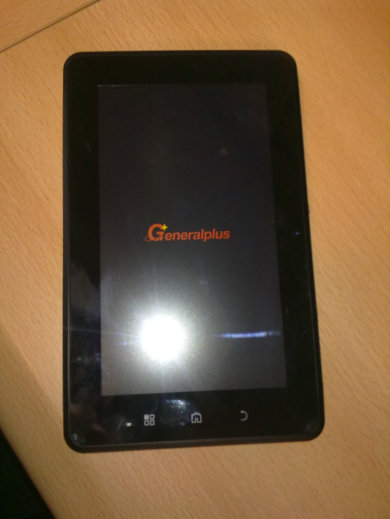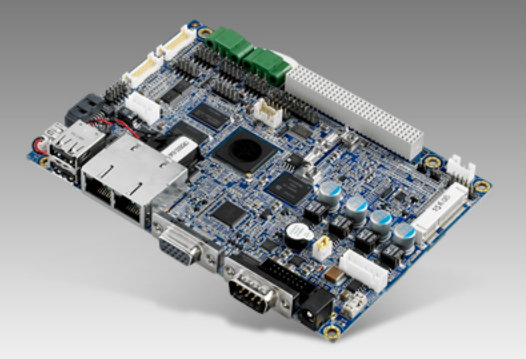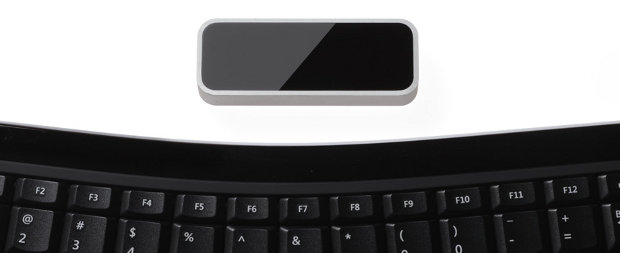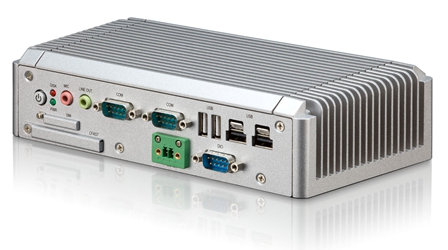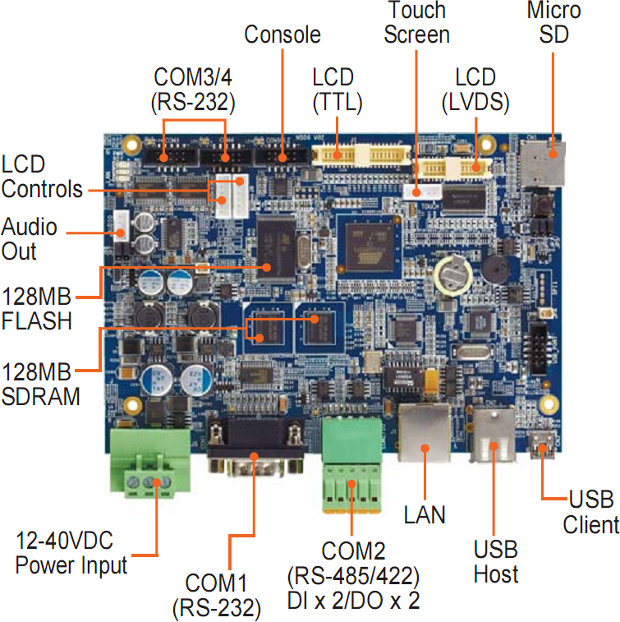I’ve recently come across Eken D70 Tablet which is a typical 7″ Android ICS tablet, except it’s product description shows a Cortex A8 chip called GP33003. After some research, I found that this chipset is provided by GeneralPlus (previously part of Sunplus). GP3300x application processor features a cortex A8 clocked at 1 GHz together with a PowerVR SGX531 GPU, and comes in 216pins LQFP package. This SoC integrates LVDS and HDMI, and the company told me that the GP33XX targets “higher resolution displays, but still keep the lower PCB cost, compared to its current competitors”. It also features an hardware video decoder and encoder (up to 1080p), and can handle a 720p full-duplex video conference. That’s about all the information I could get about the SoC itself. I’ll update this post If I find out more. The company also provides a tablet reference design (GP3300xA Tablet) with the following specifications: […]
Advantech RSB-4210: Freescale i.MX53 Single Board Computer
Advantech has just launched the RSB-4210, a fanless and heatsink-less RISC Single Board (RSB) powered by Freescale i.MX53 (Cortex A8) with 512 MB DDR3 and 2 GB NAND Flash. This board can operate in industrial temperature range (-40 to 85° C) and targets industrial control, digital signage, HMI/kiosk, medical, and portable applications. Here are the key features of this board: Freescale ARMCortex-A8 i.MX536 @ 800MHz Supports OpenGL ES 2.0 and OpenVG 1.1 hardware accelerators Supports full HD 1080p video decode and HD 720p hardware video encode Video Output LCD support with resolution up to 1920×1080 (default 800×480) via LVDS connector HDMI VGA Touch, UART, I2C, I2S, SPI, GPIO, USB Supports SATA storage interface and CAN-bus for vehicle applications Dimensions – 146 x 102 x 20 mm Power – 9 ~ 24 V DC with 3-watt power consumption Operating temperature – -40 ~ 85° C If you don’t mind about the […]
Dell Announces Copper ARM Servers Based on Marvell ARMADA XP SoC
It looks like 2012 will be the year of ARM servers. After previous announcements of ARM servers based on Calxeda and Applied Micro SoC, Dell has just announced its own “Copper” ARM servers powered by Marvell ARMADA XP SoC (MV78460) that allegedly runs Ubuntu Server with a LAMP stack. Dell “Copper” ARM server is composed of 12 sleds with 4 SoC each slotted into a 3U C5000 Chassis. Here are the specs: Form factor 3U chassis 48 independent servers Architecture 1S 1.6GHz, quadcore Marvell Armada XP system on a chip (SoC) 4 discrete server nodes per sled 12 sleds per 3U chassis Memory 1 DIMM slot DDR3 UDIMM VLP, 1333MHz up to 8GB per node Drive bays 1 x 2.5″ SATA per node Hard disk drives 2.5″ SATA (7.2K rpm) Networking 1GB Marvell Ethernet uplink per node (QSGMII) connected to Marvell Integrated L2 Switch (98DX4122) Dell believes that ARM based […]
Leap Motion Lets You Control Your Computer With Finger Gestures
Leap Motion is a tiny USB device, about the size of a thumb drive, that let’s you control your computer with hands and fingers (and even pencils) gestures in three dimensions using motion sensing and motion control technology. The company claims that Leap technology is 200 times more accurate than existing solutions with an accuracy up to 0.01 millimeter (which seems over the top). To use the LEAP, simply plug it into a USB port, install Leap Motion software, calibrate the device and you’re ready to control your PC a la minority report. This technology will probably not displace the mouse and keyboard, as your arms would get very tired after a while, but there are some good use cases: Stylus emulation and 3D images creation. Gaming. 3D modeling software interaction. Sign a document digitally with a pen. User interaction in Windows 7/8 or Mac OS X: Clicking, grabbing, scrolling, […]
Linux 3.4 Release
Linus Torvalds has just announced the release of Linux Kernel 3.4 on the 20th of May: I just pushed out the 3.4 release. Nothing really exciting happened since -rc7, although the workaround for a linker bug on x86 is larger than I’d have liked at this stage, and sticks out like a sore thumb in the diffstat. That said, it’s not like even that patch was really all that scary. In fact, I think the 3.4 release cycle as a whole has been fairly calm. Sure, I always wish for the -rc’s to calm down more quickly than they ever seem to do, but I think on the whole we didn’t have any big disruptive events, which is just how I like it. Let’s hope the 3.5 merge window is a calm one too. Linus Linux 3.3 merged Android drivers to mainline, added further improvements to btrfs and ext-4 file […]
Getting Ubuntu armel/armhf Rootfs in Ubuntu 12.04
I’ve recently upgraded to Ubuntu 12.04 and this is a great operating system. However, if you do some arm development and expect to be able to install cross libraries (armel/armhf) or easily generate an arm rootfs using the tools you’ve been used to, you’ll be disappointed. In Ubuntu 11.10 (Oneiric), I used xapt and dpkg-cross to retrieve armel libraries, but it’s broken for Ubuntu 12.04, at least on my system. I’ve been told to switch to multiarch because this will be how it’s done from now on. But I soon discovered this is work in progress as quite a few packages are not multiarched yet including python. Ubuntu developers also decided to remove rootstock (which makes sense since xapt/dpkg-cross will be deprecated), so if you want to generate a rootfs the “gool ol’” way (which won’t be supported much longer), you’d have to install an Oneric chroot to run rootstock, […]
VIA Technologies Announces VIA AMOS-3002 System For Embedded Applications
VIA Technologies has just unveiled the VIA AMOS-3002, a fanless system based on VIA EPIA-P900 Pico-ITX board, targeting embedded applications such as telematics, in-vehicle control, machine to machine controller (M2M), digital signage and kiosks. The VIA EPIA-P900 Pico-ITX board is powered by VIA Eden X2 dual core processor (1GHz) together with VIA VX900H media system processor (MSP) and VIA Chrome 9 video processor which render VIA AMOS-3002 systems capable of handling hardware video decoding for MPEG-2, WMV9 and H.264 codecs at 1080p resolution. Two models are available: AMOS-3002-2D10A1 and AMOS-3002-2D10A1. The latter features a 2.5” SATA hard disk drive bay which is not available in AMOS-3002-2D101A1. Here are the specifications for both VIA AMOS-3002 Models: CPU – VIA Eden X2 @ 1.0GHz Chipset – VIA VX900H Media System Processor Memory – 1x DDR3 1066 204-pin SODIMM socket (Up to 4GB) Storage: 1x CFast Flash disk socket 1 x 2.5” SATA hard […]
Artila M-506 and M-606 ARM9 Industrial Single Board Computers
Artila Electronics announced 2 new single board computers (SBC) based on Atmel SAM9G45 ARM9 Processor: Artila M-506 running Linux 2.6.38 Artila M-606 running Wince 6.0 Both models features the same hardware with a standard 3.5” form factor, Atmel AT91SAM9G45 Processor, 128MB DDR2 RAM, 128MB NAND Flash and 2MB DataFlash and only differ by the operating system and software used. The company explains that the board targets industrial application such as intelligent transportation system (ITS), building automation, energy-saving system, and scenario control systems. Here are the hardware specifications for both devices: CPU – ATMEL AT91SAM9G45 @ 400MHz Memory – 128MB SDRAM Flash – 128MB NAND & 2MB DataFlash for system recovery On-board TTL/LVDS LCD interface Supports 5V/12V TFT LCD panels, up to 1280 x 860 pixels Ethernet: 1x, 10/100Mbps COM port – 3x RS-232, 1x RS-422/485 USB Host – 4x USB 2.0 HS ports. Micro-SD Card – 16GB max. GPIO – […]


